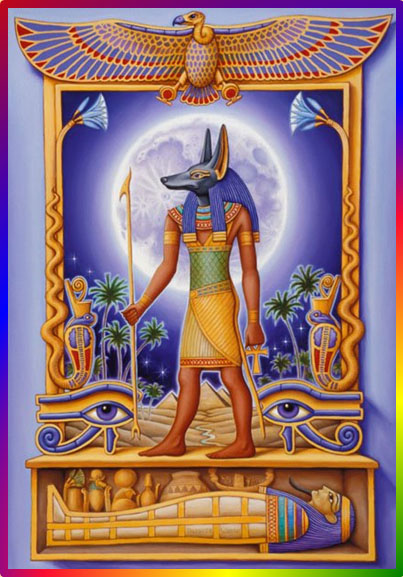 The God Anubis
The God Anubis
The God Anubis preparing to guide the deceased on the journey through the world of the dead. In the Egyptian language, Anubis was known as Inpu, Anup, Anpu and Lenpw.
The ancient Egyptians were the people for whom the sacred path and the afterlife represented the most important and crucial themes in their lives.
Their concern with the afterlife was so deep that we can affirm that they lived to prepare for the afterlife.
They believed that after death, their soul would be judged by the God Anubis, according to complex principles and rites described in the "Book of the Dead." Their deeds would be evaluated by the deity, and their heart would be weighed on a golden scale against the "Feather of Truth." If the heart weighed more than the feather due to infamous acts committed by the deceased during their earthly life, the deceased would be handed over to the God Ammit to be devoured. The God Ammit was a demon whose body was composed of parts of a lion, crocodile, and hippopotamus.
 The God Ammit
The God Ammit
Ammit was an Egyptian female deity, also known as Ammut and Ahemait, who was an integral part of the process of judging the deceased.
She was seen as the devourer of the dead because she devoured the hearts of the deceased who did not pass the tests to which they were subjected.
According to Egyptian mythology, after death, one had to stand before Osiris in a judgment that took place in the underworld or Duat. During this process, the deceased's heart was weighed on a scale, with a feather on the other side.
If the deceased's heart weighed less than the "Feather of Truth," they would be guided to paradise, where they would inhabit their body, which should have been preserved through the mummification process. In paradise, the deceased would be resurrected and inhabit their physical body, free from diseases and death, and they would also have access to all their earthly possessions and everything they had acquired during their life on Earth.

The Book of the Dead

The Book of the Dead and its precepts played a role of utmost importance in Egyptian spirituality and their quest for the Sacred Path. In the above papyrus, we see part of the rites required in the journey of the soul of the deceased.
In the figure on the side, we see a scroll illustrating the ceremony of weighing the deceased's heart.






